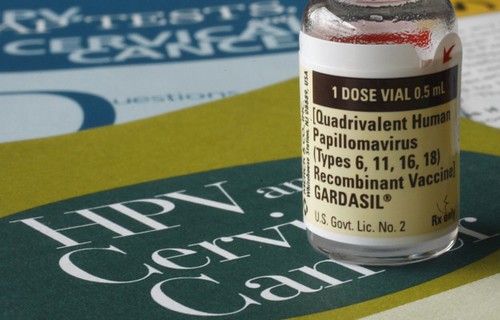
A vaccine for Human Papillomavirus (HPV) that impacts 79 women in the United States. Researchers say the vaccine is not as effective among African Americans., a photo by Pan-African News Wire File Photos on Flickr.
Wednesday, November 6, 2013
HPV Vaccines Not As Effective For African-American Women
The strains of the human papillomavirus (HPV) most common in African-American women are not targeted by the currently-available HPV vaccines.
A new study, funded by the National Cancer Institute, found that two subtypes of HPV used in current vaccines are half as likely to be found in African-American women than in white women.
The senior author of the study, Duke University professor Dr. Cathrine Hoyo, joins Here & Now’s Robin Young with details.
Guest: Dr. Cathrine Hoyo, associate professor of obstetrics and gynecology at Duke University.
ROBIN YOUNG, HOST:
From NPR and WBUR Boston, I'm Robin Young. It's HERE AND NOW.
And it's estimated some 79 million Americans are infected with HPV, the human papillomavirus that's sexually transmitted and the main cause of cervical cancer in women.
The Centers for Disease Control recommends that all girls and boys aged 11 or 12 get the HPV vaccine to protect against the virus.
But there are more than 100 strains of HPV. The two vaccines on the market protects against just strains 16 and 18. And a new study finds these strains are more frequent in white women than in black, which means black women aren't as protected by the vaccines.
Cathrine Hoyo is an associate professor of obstetrics and gynecology at Duke University School of Medicine and senior author of the study. Dr. Hoyo, tell us about your study. What are we looking at?
DR. CATHRINE HOYO: We were looking at incidents of cervical cancer where we have about 12,000 cases in the United States in 2013, for example. And if you look at the distribution of this cancer, it's actually much more in African-Americans. And African-Americans are more than two times more likely to die from it. Then you go to the CDC data, and it suggests that, in fact, they're being screened just as much, if not a little more.
So this was the paradox that led us into this study where we said, how come we have such a successful screening program that has early detection and now we are seeing African-Americans dying and having incidents that is a lot higher than whites? So we went and actually had them genotyped at Johns Hopkins and found exactly what we thought, which was the fact that HPV 16 and 18, which is the most virulent and is associated with about 70 percent of invasive cervical cancer, was half as common in African-Americans.
YOUNG: So it sounds as if you're saying that you found in African-Americans the strains of HPV that the vaccine addresses but not as frequently as you found other strains in African-Americans. What does this say to you?
HOYO: I think the most direct thing it says, given the data we have, is that if a physician is looking out for 16 and 18, which we know is responsible for about 70 percent of cervical cancer cases, you may actually end up missing some of these cases because it seems like they're half as common.
YOUNG: So that's screening for the virus. What about prevention? Are there new vaccines in the pipeline that will better attack the strain of the virus that more affects African-American women?
HOYO: Actually, there is a vaccine in the pipeline that is in phase-three trial by - I think it's Merck. And it does address some of this. It does address, in addition, 33, 31, HPV 45, 52 and 58. But again, if we look back at what are the most frequently occurring ones, it's HPV 35 and 66, which seem to be not included in the vaccine. So I think that the way to look at this looking into the future is that replicating these findings will be important. And also, think about how we can explore these ethnic differences so we can get a handle of why something like this would happen.
YOUNG: And by the way, should African-American young girls still take the HPV vaccine that's more likely to address the strains 16 and 18, which they're less likely to get?
HOYO: I would say so. Because if we look at the numbers, it is not that they're not getting it. White women are getting it at 64 percent, and African-Americans a little under 40 percent. So I would say yes. But looking out for the new vaccines should be a must.
YOUNG: Dr. Cathrine Hoyo, associate professor of obstetrics and gynecology at Duke University School of Medicine, senior author of this new HPV study. We'll link you the information at hereandnow.org. Dr. Hoyo, thank you so much.
HOYO: Thank you.
YOUNG: Fascinating. You're listening to HERE AND NOW. Transcript provided by NPR, Copyright NPR.
No comments:
Post a Comment